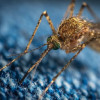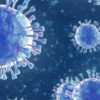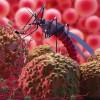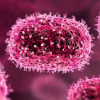
 Mrs. Mayuri Mathur
Mrs. Mayuri Mathur
Ear Eczema: Dermatitis of Ear Canal
Eczema is a chronic skin condition marked by red, itchy, and inflamed skin, known as atopic dermatitis. It is often seen as an itchy, dry rash that can occur anywhere on the body but is most commonly found on the face, neck, hands, and feet. Eczema is not contagious, though environmental factors, such as stress, allergens, and extreme temperatures, can trigger it.
What is ear eczema?
Ear eczema is a clinical condition characterized by dry, discoloured, itchy, and bumpy skin affecting both the outer portion of the ear and the inner ear canal. It can cause damage to the skin barrier, making it more sensitive and more prone to infection, dryness, and other complications. Symptoms may range from mild to severe and require prompt medical attention. Ear eczema can affect any part of the ears, including:
• Outer ears (pinna), including ear lobes.
• Inner ears, including ear canals.
• Behind the ears.
• The skin between ears and face.
Ear eczema can affect anyone; however, it’s more common in people with:
• A personal or family history of eczema.
• Asthma.
• Environmental allergies.
• Hay fever (allergic rhinitis).
Symptoms of Ear Eczema
Common symptoms of ear eczema include redness, itchiness, flaking, and swelling of the skin. It may also present physical signs such as
• Dry, scratchy skin
• Discoloured rashes.
• Bumps over the skin.
• Leathery patches on the skin.
• Crusty skin.
A burning sensation and a discharge from the affected area may accompany ear eczema. In severe cases, blisters may appear. Ear eczema doesn’t hurt in itself. However, scratching may break the skin, leading to an infection that can cause pain.
Types of ear eczema
Different types of eczema can develop in the ears, including:
• Allergic eczema (contact dermatitis): immune system overreacts to minor irritants or allergens if the person has allergic eczema. This overreaction can infuriate the skin. Common irritants and allergens are earrings, hair and skin care products, food, pollen, cell phones, or headphones.
• Asteatotic eczema: This type of eczema is often described in people 65 years and older. Changes in the weather or temperature cause asteatotic eczema, and it particularly flares up during the winter season. Low humidity can promote dryness and itchiness in the skin. It may also be due to the use of harsh soaps, wool, and hair and skin care products.
• Seborrheic dermatitis: It commonly affects the oily parts of the body, including the ears, scalp, nose, and chest.
Causes of ear canal eczema
There may be numerous reasons for eczema in the ear canal, resulting in the breakdown of the skin’s protective layers. Common causes of ear eczema include allergies, skin infections, environmental irritants, and contact dermatitis. Other factors contributing to the development of ear eczema include genetics, hormonal changes, certain medications, and certain health conditions, such as diabetes or psoriasis. The most prominent environmental triggers for the onset of ear eczema include:
• Weather shifts
• Stress
• Contact with chemicals or irritants
• Allergens
• Clothes made from scratchy materials like wool
• Excessive washing of the skin
These factors can cause skin dryness and inflammation, leading to an eczema rash.
Diagnosis and Treatment
It is crucial to find out the cause to treat eczema. A medical professional typically makes a diagnosis after a physical examination and an assessment of symptoms. Tests such as an allergy skin test, skin biopsy, blood tests, ear cultures, and imaging scans may help diagnose the condition and rule out other conditions.
The treatment goal remains to reduce itch and discomfort and prevent infection and additional flare-ups. It may include topical with or without oral medications, lifestyle changes, and home remedies.
The best way is to recognize what triggers or worsens ear eczema and avoid it. Along with the prescribed medications, following specific skincare methods can help relieve the symptoms of ear eczema and prevent flare-ups, such as:
• Avoid common allergens, like nickel, cobalt, or copper earrings.
• Avoid sudden temperature and humidity changes.
• Use a humidifier in places with dry air.
• Wear a warm hat to cover your ears in cold weather.
• Consume at least eight glasses of water daily; it helps maintain skin health.
• Avoid rubbing or scratching the skin.
• Apply hydrocortisone cream or ointment (if the doctor advises).
• Apply moisturizing cream or ointment several times daily, including after a bath or shower.
• Petroleum jelly also helps to soothe the affected skin.
• Bathe or shower in lukewarm for not more than 15 minutes. Gently wash the ears.
• After a bath, pat dry the skin instead of rubbing it.
• Use mild, fragrance-free soaps and hair and skin care products. Opt for “hypoallergenic” or “sensitive skin” products,
• Use skincare products that contain ceramide as they replace some of the “glue” (the barrier) missing from the eczematous skin.
• Take antihistamines for severe itching after consulting your physician.
• Take prescription medications.
• Try phototherapy, as they have been shown to help certain skin disorders.
• Establish a skincare routine, and follow the healthcare professional’s recommendations for keeping skin healthy.
Remember
Ear eczema is often not a serious problem. However, they may last longer. Getting timely treatments can help clear the skin and maintain it. Consistent moisturization, avoiding triggers, and regular treatment are crucial in keeping the skin healthy.
The Bottom Line
Ear eczema may be annoying and embarrassing for many and can be alarming if it impacts hearing. It can affect the quality of life or make people feel self-conscious; however, it’s familiar and very normal. Proper skincare routine and treatment can reduce the impact of ear eczema. It is better to visit the healthcare provider at the earliest signs of ear eczema.

Mrs. Mayuri Mathur
Mrs. Mayuri Mathur is a Senior Medical Writer (Patient education and digital) and seasoned content creator with a rich tapestry of expertise spanning over ten years. With a diverse background in content creation, she brings a wealth of experience to the table, from crafting insightful medical articles to developing comprehensive patient education materials, dynamic press releases, and captivating brochures and website content. Throughout her illustrious career, she has demonstrated an exceptional knack for distilling complex medical concepts into easily understandable content, making her a trusted resource for both professionals and lay audiences alike. Her meticulous attention to detail and innate creativity have enabled her to deliver content that not only informs but also engages and inspires. Whether elucidating intricate medical procedures or crafting compelling marketing materials, her versatility and dedication shine through in every project she undertakes. Her passion for writing, coupled with her profound understanding, makes her an invaluable asset to any team or project. In a constantly evolving digital landscape, where effective communication is paramount, Mrs. Mayuri Mathur stands out as a beacon of excellence, consistently delivering top-notch content that resonates with audiences across diverse platforms.












Please login to comment on this article